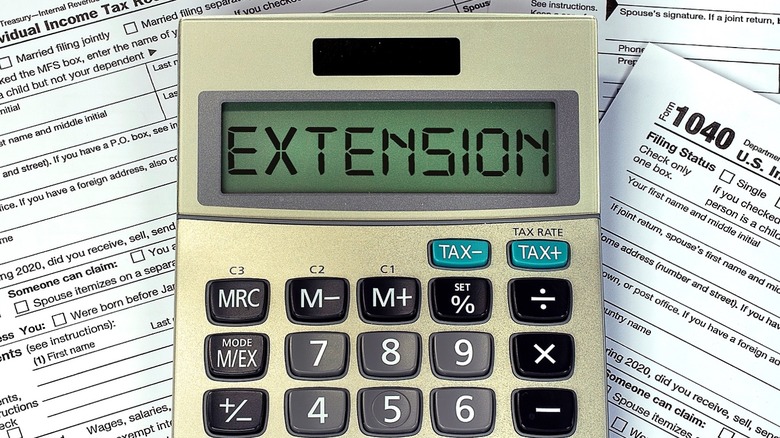The 2024 Tax Extension Deadline Is Fast Approaching. What Happens If You Miss It?
While many of us might have experienced the stress of filing by the last day of tax season back in the spring, another estimated 19 million taxpayers are in the thick of their own last-minute tax season right now. Anyone who filed for a tax extension for the 2023 tax season must file by October 15, 2024. Like the classic April deadline, taxpayers must file via online or paper form (although the IRS urges filers to use electronic means). If you failed to apply for a tax-filing extension by the April 15, 2024, deadline, it's important you submit your tax return and pay your owed taxes as soon as you can.
With that being said, those who did file for an extension on time still need to keep some important details in mind. Perhaps the most important thing to remember about an extension to file is that it is NOT an extension on paying what you might owe in taxes. In fact, the IRS expects those who apply for a deadline extension to pay at least 90% of their estimated total tax bill on or before the regular tax due date (in April).
The expectation is that, upon actually filing your tax return (by October 15), you will pay whatever remaining balance is due. Those who might still owe taxes should take into consideration the penalty fees and interest applied to their owed amount when considering when to pay (we will break these down later). It's also worth considering the IRS' payment plans to help make any owed tax balance more manageable.
Missing the tax-filing extension deadline
As the only extension offered, there's no additional way to extend your filing deadline past October 15. This means you must file taxes by this date or face a host of consequences (the same can be said for those who missed the April deadline).
For starters, there are two important penalties to keep in mind — and they can add up fast. The IRS charges a failure-to-file penalty of 5% of the amount you owe for every month your tax return is late (and this is calculated from the original due date of April 15, not the extension deadline). While this IRS penalty fee maxes out at 25% of the amount you owe (or at five months late), this can still turn into a significant amount of money. The other penalty is the failure-to-pay penalty, which is 0.5% of the unpaid taxes you owe for each month you fail to pay. This penalty maxes out at 25% of the total amount of your unpaid taxes.
The other significant element to include in these calculations is interest. For instance, for those who may have applied for a deadline extension, the IRS began charging interest on any owed tax amount starting immediately after the April tax-filing deadline. Another thing to consider is that the IRS also charges interest on any penalties you're charged. This means that if you did not pay at least 90% of your owed amount back in April, you could be facing a significant bill in October.
Other things to keep in mind
If you still fail to file your taxes after the extended tax deadline (as well as fail to pay any owed taxes), you could face even worse penalties than fees and interest charges. The IRS is authorized to use both levies and liens against you in pursuit of delinquent taxes. For those who might know, a lien is a legal claim against your property in order to secure payment on your tax debts while a levy is the physical seizure of your property to secure payment of your tax debts. Liens can be placed on everything from your home and vehicles to your financial assets. A failure to pay could lead the IRS to levy things like your bank accounts, retirement funds, wages and income, rental property income, or even life insurance value. It's extremely important to file and communicate with the IRS about any necessary payment plans you might require.
It's also worth remembering that, even if you might be facing a messy or confusing extended tax deadline this year, it can pay to start planning ahead for tax season (in fact, there's really no shortage of benefits to filing your taxes early). From having a clearer picture of how much you might owe in taxes (which gives you more time to plan ahead for how to pay) to ensuring your tax return doesn't end up counting as late due to errors like forgetting to sign it, filing early can mitigate a lot of the stress and headaches involved with the tax-filing process.


